Brandon Stanton's Blog, page 6
September 13, 2023
(22/54) “Dr. Ameli was elected to parliament in the same...
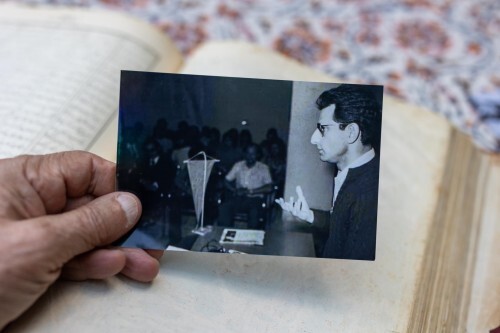
(22/54) “Dr. Ameli was elected to parliament in the same election, and was chosen by his peers for a leadership position. He was a unifying figure. A man without enemies. His words never cut. He attacked philosophies; never people. And he was one of the best speakers in parliament. He didn’t use slogans. He spoke with depth. And somehow, no matter how specific the policy, or how divisive the issue, he always came back to a place of unity. Our common destiny as a people. On the morning our first budget was presented Dr. Ameli approached me in the halls of parliament. He asked if I planned to give a speech. I told him I did not, because I had no specific objections. He leaned close to my ear, and with a soft voice he said: ‘Still, you must speak. To separate yourself from the system.’ That night I slept on a rug on the floor of parliament, and first thing in the morning I placed myself on the calendar of speakers. When my turn came I walked down the aisle toward the podium. My knees felt weak. There is a magnitude to speaking in parliament, a consciousness of history. I’ve never been a natural speaker. I’m never the one chosen to give a toast at parties. But if I believe a statement is true, I can say it. No matter how big the stage. Truth has power. Truth has a force. 𝘕𝘪𝘳𝘰𝘰. It doesn’t come from the tongue, it comes from within. And the moment I take my place at the podium: it’s like a spring has been sprung. That day I spoke about justice. 𝘋𝘢𝘢𝘥. I said that justice in society begins with justice in our budget. There was a proposal in the budget to build a new telephone system in one of Tehran’s nicest neighborhoods. I reminded the parliament that there were entire villages without a single phone. I said: ‘Before we give the wealthy a phone by every bedside, let us give a phone to every village.’ It was one of the most forceful speeches I’ve ever given. But there was no mention in the media; criticism of the government was not allowed. I at least wanted a copy for my own records. There was a person in parliament who transcribed everything, so I asked them for a copy of my speech. But they told me it was not allowed. They would not even give me my own words.”
دکتر عاملی هم در انتخابات مجلس پیروز شده بود و افزون بر آن به ریاست کمیسیون آموزش و پرورش هم. از بهترین سخنرانان بود. هنگام سخنرانی هرگز فریاد نمیکشید. واژگانش آزاردهنده و خشن نبودند. او به فلسفهها میپرداخت نه به آدمها. سخنانش ژرفای ویژه داشتند. هرگز شعارگونه سخن نمیگفت. سراپای سخنانش به هم پیوسته بود. هر اندازه موضوع پیچیده بود، هر اندازه طرح و برنامه ویژه بود، همیشه آنرا به سرنوشت ایران و ایرانیان گره میزد، سرنوشتمان به عنوان یک ملت. در نخستین بامدادی که بودجهی دولت ارائه شده بود، دکتر عاملی در راهروی مجلس به من نزدیک شد. پرسید که آیا قصد دارم در مورد بودجه سخنرانی کنم. به او گفتم که تمایل ویژهای ندارم . نزدیکتر آمد و به آرامی گفت: «همیشه باید سخن گفت، ما سخنان خود را میگوییم.» نخستین کاری که کردم نوشتن نامم در فهرست سخنرانان بود. آن شب را روی فرشی بر زمین مجلس بیتوته کردم. وهنگامی که نوبت من شد پشت سکوی سخنرانی رفتم. سخنرانیهای بسیاری پیش از این انجام داده بودم ولی سخنرانی در مجلس متفاوت بود. از اهمیت و شکوه خاصی برخوردار است. همراه با نوعی خودآگاهی تاریخی. من هیچگاه سخنرانی طبیعی نبودم. نمیتوانم به شیوایی دربارهی موضوعهای گوناگون صحبت کنم. هیچگاه در مهمانیها مرا برای خوشآمدگویی انتخاب نمیکردند. ولی هرگاه به درستی گفتاری باور داشته باشم، آنرا به زبان میآورم. نیرویی هست که با گفتن حقیقت همراه است. از زبان نه که از دل برمیآید. هنگامی که پشت سکوی سخنرانی قرار بگیرم، مانند فنری رها میشوم. آن روز دربارهی عدالت و دادگری سخن گفتم. همانگونه که به دادگری در قانون، در بودجه هم نیازمندیم. به طرحی اشاره کردم که برای کشیدن سامانهی تلفنی تازهای برای یکی از مرفهترین منطقههای تهران بود. به مجلس یادآوری کردم، روستاهایی داریم که حتا یک تلفن هم ندارند. گفتم: «پیش از آنکه خط تلفن را به اتاق خوابهای ثروتمندان شهرها بکشیم، بیایید نخست تلفن عمومی را به همه جای کشور برسانیم.» سخنانم در هیچ جا بازتابی نیافت؛ هیچ انتقادی اجازهی پخش در رسانهها را نداشت. از منشی مجلس نسخهای از آنچه را گفته بودم درخواست کردم تا سندی از آن داشته باشم. به من گفتند که اجازهی چنین کاری را ندارند. سخنان خودم را هم به من ندادند
(21/54) “After the election I took one more visit to Ferdowsi’s...
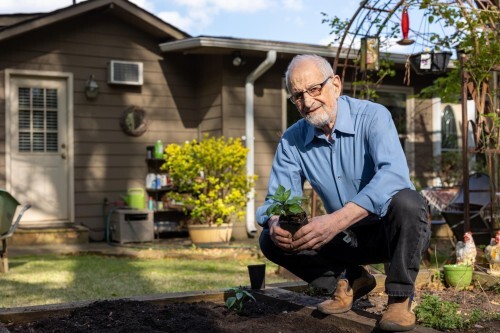
(21/54) “After the election I took one more visit to Ferdowsi’s tomb. This time I brought my own children with me. It hadn’t changed much in thirty years, but I had changed. I had a better understanding of the sacrifice he’d made for his ideals. Ferdowsi worked for thirty-three years. Seven verses a day. 𝘈 𝘤𝘢𝘴𝘵𝘭𝘦 𝘰𝘧 𝘸𝘰𝘳𝘥𝘴, 𝘵𝘩𝘢𝘵 𝘯𝘰 𝘸𝘪𝘯𝘥 𝘰𝘳 𝘳𝘢𝘪𝘯 𝘸𝘪𝘭𝘭 𝘥𝘦𝘴𝘵𝘳𝘰𝘺. While my children played in the gardens I stood quietly at the foot of his tomb. I ran my fingers across the stones. ‘In The Name of The God of Soul and Wisdom.’ 𝘑𝘢𝘢𝘯 and 𝘒𝘩𝘦𝘳𝘢𝘥. The two things all humans have. The wisdom to choose. And the soul to create. When I received the development budget for Nahavand, I called a meeting in the town’s biggest auditorium. Each village sent a representative. I told them: ‘God created the earth, the trees, and the waters, but after that he did not make a single chair. He has left the rest to us.’ I told them: ‘Organize a council, assess your own needs, make specific proposals.’ I’d only pay for things that could be seen, because I wanted no corruption in Nahavand. And priority was given to projects where labor was provided by the villagers themselves. I wanted them to get involved, participate. I wanted them to feel a sense of ownership. I wanted an Iran where everyone felt like the king or queen of their own country. Back then it was common for villagers to kiss the hands of government officials. I would not allow it. I told them: ‘We don’t need to do this anymore.’ If I was unable to stop them in time, I’d kiss their hand right back. There was one woman in Nahavand who lived in a tent. I promised her that I would not own a home before she did. I tended Nahavand like I tended my garden. I picked every weed the moment it appeared. I followed up on every call, every letter. My phone was never unplugged. My plan was to serve two or three terms, so that I could gain some experience and build my name. Then I’d bring my ideas directly to the people. What I could do for my garden, I could do for Nahavand. And what I could do for Nahavand, I could do for all of Iran.”
پس از انتخابات، سفری دیگر به آرامگاه فردوسی رفتم. بچهها همراهم بودند. در حالی که آنها در باغ و میان درختان سرگرم بازی بودند، خاموش پای آرامگاه ایستادم، انگشتانم را به نرمی بر سنگ آرامگاه کشیدم. بیش از هزار سال است که پیکر پاکش درون این خاک گرامی خفته است. «به نام خداوند جان و خرد.» دو پدیده که همهی مردمان از آن برخوردارند. خرد برای گزینش و جان برای کوشش و آفرینش. فردوسی سیوسه سال کار کرد. میانگین روزانهاش هفت بیت است. کاخی از نظم پی افکند که از باد و باران نیابد گزند. آرامگاه در این چهل سال تغییر چندانی نکرده بود. من ولی تغییر کرده بودم. آگاهی و شناخت بیشتری از فداکاریهای او برای آرمانهایش داشتم. در آغاز دورهی نمایندگیام، بودجهی اندکی در اختیار نمایندگان گذاشتند تا خرج آبادانی روستاها شود. به جای قسمت کردن آن به طور مساوی میان روستاها، جلسهای در سالن بزرگ شهر برگزار کردم، به نمایندگان روستاها گفتم که انجمنهایشان را تشکیل دهند. نیازمندیهای خود را ارزیابی کنند و پیشنهادهای دقیق ارائه دهند. گفتم: «خدا زمین، درختان و آب را آفرید ولی پس از آن یک صندلی هم نساخته است. کارهای دیگر با ماست.» میخواستم مسئولیت آنان را نسبت به خود و جامعه یادآور شوم، چشم به راه کسی نباشند تا دشواریهایشان را آسان کند. ایرانی میخواستم که همه در آن مشارکت داشته باشند. ایرانی که در آن زن و مرد ایرانی شهریاران میهناند. از دیرباز در روستاها بوسیدن دست بزرگانشان رسم بود ولی من هرگز این را نپذیرفتم. گفتم: «نیازی به این کار نیست.» و اگر ناگهانی پیش می آمد من هم بیدرنگ دست آنها را میبوسیدم. در نهاوند زنی تنها کنار شهر در چادر میزیست. از من درخواست خانه داشت، به او گفتم تا زمانی که او خانهدار نشود من هم خانهدار نخواهم شد، کاش دستکم او تا کنون صاحب خانهاش شده باشد! به نمایندگان قطعه زمینی با بهای ارزان پیشنهاد شد، من نپذیرفتم. از نهاوند مانند باغچهی خودم پرستاری میکردم. همینکه گیاه هرزهای نمایان میشد آنرا از ریشه میکندم. تلفن من هرگز بسته نبود. همهی تلفنها و نامهها را پیگیر بودم. اگر در توانم بود یاری کنم، میکردم. برنامهام این بود که دو یا سه دوره خدمت کنم تا مرا به درستی بشناسند، پس میتوانستم به یاری آرمانخواهان دیگر راه پیشرفت و سرفرازیها را بپیماییم. آنچه را برای باغچهام میتوانستم بکنم، برای نهاوند هم خواهم توانست و آنچه را که برای نهاوند بتوانم، برای ایران هم شدنیست
September 12, 2023
(20/54) “Dr. Ameli helped me open a party office. He was an...
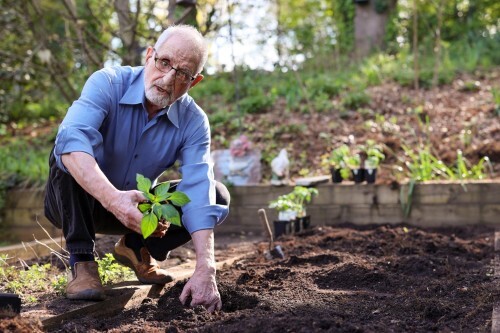
(20/54) “Dr. Ameli helped me open a party office. He was an established man by then. But he took the time to come to Nahavand, and I’ll never forget the speech that he gave. He said: ‘Now it is winter, the rivers are frozen, the trees are all dead. But soon green sprouts will burst from the soil. The air will fill with the songs of nightingales. And together we will say: ‘Spring has arrived.'” There were over one hundred villages in Nahavand, and I made the decision to visit every single one. My father loaned me his jeep, and I would spend all day on the road. Most villages had a central square, and that is where I would speak. I was a practicing Muslim; I knew the Koran front-to-back. But I never spoke about religion. I spoke about what needed to be done: better roads, better schools, fresh water. I spoke about justice. Daad. About an Iran where every person got their fair share. And I spoke about freedom. Azadi. I told them: ‘The king should not choose your candidates. All of Iran should be your candidates.’ In the first few villages only a handful of people came to my speeches. It was not customary for candidates to speak directly to the voters. My two opponents stayed in their homes and held fancy parties with their friends. But as I continued to speak, word began to spread. More people came, and then those people would go tell others. I’d always give my speeches around 6 pm. Some of the stores began to close early, so that the shopkeepers could attend. At first it was just a few. But by the end of my campaign, every single shop would close. The moment my jeep pulled into town, it would be met by cheering crowds. Hundreds of people would gather around to hear me. People as far as the eye could see. On the day of the vote I took the jeep for one final trip around Nahavand. I remember seeing young women, with babies on their breast, going to cast their vote. Later that night the results were announced on television. Early in the day people began to gather around my father’s house. When the vote was announced, the crowd erupted into cheers. Each of my opponents had gotten two thousand votes. I received over twenty thousand.”
دکتر عاملی برای گشایش دفتر حزب به نهاوند آمد. او بزرگمردی ستودنی بود. سخنرانی او را فراموش نکردهام. گفت: «اکنون زمستان است، آبها یخ بستهاند، درختان مردهاند. پرندگان رفتهاند، برگ و باری و نغمه و آهنگی نیست ولی به زودی جوانههای سبز درفشهایشان را از دل خاک برخواهند افراشت. آوای بلبلان آسمان را پر خواهد کرد. و همه با هم خواهیم گفت: بهار آمد!» بر آن شدم تا با مردمانی از بیش از یکسد روستای نهاوند گفتوگو کنم. پدرم جیپش را در اختیارم نهاد و من روزها را در راه و روستا میگذراندم. درمیدان روستا با من آشنا میشدند و سخنانم را میشنیدند. با آنکه مسلمانی باورمند بودم هرگز دربارهی دین سخن نگفتم. سخن من تنها در زمینهی کارهایی بود که باید انجام میگرفت: راههای بهتر، دبستانهای بهتر، آب آشامیدنی پاکیزه و دیگر بایستههای ویژهی هر روستا. دربارهی عدالت سخن میگفتم. دربارهی ایرانی که در آن همه به حق خود برسند و دربارهی آزادی. به آنها میگفتم: «دولت نباید نامزدهای شما را انتخاب کند. هر ایرانی باید بتواند خود را نامزد کند، رأی شماست که او را برمیگزیند!» در نخستین روزها تنها تنی چند برای شنیدن سخنانم میآمدند. گفتوگوی رو در رو با رأیدهندگان امری ناآشنا بود. رقیبانم در خانههای خود میماندند و با دوستانشان مهمانیهایی برگزار میکردند. من به دیدارهایم ادامه دادم و خبر در میان مردم پخش میشد. هر روز که می گذشت، مردم بیشتری میآمدند و دیگران را باخبر میکردند. همیشه سخنرانیهایم را در میدان شهر حدود ساعت ۶ عصر برگزار میکردم. کاسبان فروشگاههایشان را زودتر میبستند تا بتوانند در سخنرانیهایم باشند. نخست شمارشان اندک بود ولی در روزهای پایانی کارزار انتخاباتی من، فروشگاههایشان را زودتر میبستند. هنگامی که جیپ من وارد شهر میشد، جمعیتی هوراکشان به پیشباز میآمدند. کسانی از راه های دورتر میرسیدند تا سخنانم را بشنوند. تا جایی که چشمم کار میکرد مردم ایستاده بودند. در روز انتخابات با جیپ پدرم به چندین روستا سرکشیدم. به یاد دارم که زنان جوان با کودکی در آغوش به سوی صندوق های رأی در راهند. در واپسین ساعتهای آن شب نتیجه از تلویزیون پخش میشد. مردم کم کم پیرامون فرمانداری که به خانهی پدرم هم نزدیک بود گرد میآمدند. هنگامی که نتیجه اعلام شد همه از شادی فریاد کشیدند. هر یک از رقیبان من دو هزار رأی آورده بودند. من بیش از بیست هزار
(19/54) “It has always been my philosophy: wherever I am, I try...
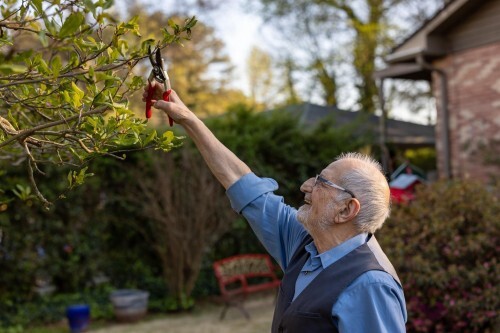
(19/54) “It has always been my philosophy: wherever I am, I try to make the most of the responsibilities I am given. Managing a factory was not my ideal position. I had hoped to find a place where I could have more of a national impact. But I tried my best to improve the lives of the people nearest to me. I continued to hold meetings with the workers. I studied employment practices from all over the world, and drafted a policy of worker’s rights. It was very progressive for the time. But when I presented the document to the Department of Labor, it was approved for the entire factory. Five thousand lives were made better. In 1975 the king made an announcement that he was dissolving all political parties and combining them into one. He claimed that it was an attempt at unity, but it was abhorrent to me. A country cannot be ruled by a single voice. In the next election I decided to return to Nahavand and run for parliament as my own man. Mitra was against it. She told me that I was too honest for politics, too naive. She said: ‘Even if you win. You’re a single voice. The rest of the parliament will still be controlled by the king.’ Even my father didn’t want me to run. He didn’t think I stood a chance, and he didn’t want to see me get my heart broken. The king had to approve all candidates, and he’d chosen two of his closest allies as my opponents. One of them played volleyball with the king and empress. The other was Undersecretary of Education for the entire country. He was so confident of his victory that he’d already resigned from his previous position. After I announced my candidacy, he paid me a visit. He told me: ‘I want you to know. Everyone in government is supporting me. And this position has been promised to me.’ I told him: ‘I’m very happy for you. I have no intention of winning. But I am going to say what I have to say.”
فلسفهی زندگیام همواره بر آن بوده است که بیشترین تلاشم را در هر جایگاه و مسئولیتی که به من داده شود انجام دهم. کار من در کارخانهی ذوبآهن اصفهان مدیریت بخش ارزیابی و آمار بود. پیشهی دلخواهم نبود. مهندس مکانیک و کارشناس اقتصاد فنی ملی بودم. دوست داشتم برنامهریزی کلان کشور را یاری کنم. پیشنویسی از قانون حقوق کارگران آماده کردم. از بررسی همهی قانونهای کار جهان پیشرفته بهترینها را برگزیدم. پیشنویس تنها به هدف استفاده در کارخانهی خودمان نوشته شده بود. هنگامی که آن سند را به وزارت کار دادم، پسندیدند. کیفیت زندگی ۵۰۰۰ کارگر کارخانه بهبود یافت. سال ۱۹۷۵ شاه اعلام کشور یکحزبی کرد. وی از اتحاد میگفت ولی ناخوشایند بود زیرا با یک صدا نمیشود رهبری کرد. کار سیاسی تنها از درون حزب رستاخیز میگذشت. اساس حزب همان قانون اساسی بود که دربرگیرندهی سلطنت مشروطه و انقلاب سفید هم بود. آرمان را باید پی میگرفتم، سخن گفتن با مردم رهگشای آیندهی روشن است. بر آن شدم که در انتخابات بعدی از نهاوند نامزد شوم و آرمانهایم را برای ایران و ایرانیان در آن کارزار با مردم در میان بگذارم. میترا موافق نبود. گفت که من برای سیاست خیلی درستکارم، خیلی ناوارد هستم. او گفت: «حتا اگر پیروز شوی، تنها یک صدا هستی. بقیهی مجلس همچنان تحت فرمان شاه خواهد بود.» پدرم نیز امیدی به پیروزی من نداشت و نمیخواست دلشکسته شوم. بر آن بود که نامزدها باید مورد پذیرش شاه باشند، دو نفر دیگر بختشان از این بابت بلند بود. یکی از آنها در کاخ با شاه و شهبانو والیبال بازی میکرد. دیگری معاون وزیر آموزش و پرورش کشور بود. به آن اندازه از پیروزی خود اطمینان داشت که از سمت خود کنارهگیری کرده بود. پس از آنکه نامزدی خود را اعلان کردم، با من تماس گرفت. گفت: «تنها خواستم بدانی که همهی دولتمردان از من پشتیبانی میکنند و این مقام از پیش به من وعده داده شده است.» پاسخ دادم: «برای شما خوشحالم. به پیروزی نمیاندیشم. برای شناساندن اندیشههایم میآیم.»
(18/54) “The king threw a celebration on the 2500th anniversary...
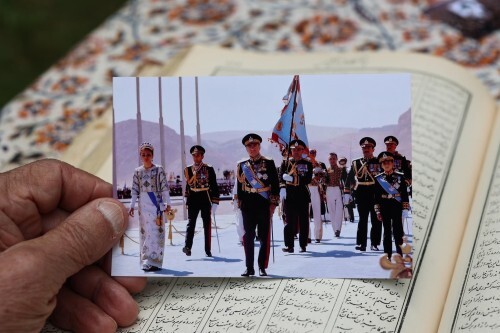
(18/54) “The king threw a celebration on the 2500th anniversary of the Persian monarchy. It was the largest gathering of world leaders in history. He constructed a city of tents around the ruins of Persepolis, where Cyrus’s grandson Xerxes ruled the ancient world. 1500 cypress trees were planted in the middle of the desert. There were vast carpets of petunias and marigolds. The king opened the ceremony with a speech at the tomb of Cyrus The Great. As he spoke, his voice shook with emotion. He said: ‘Rest in peace, for we are awake. In a troubled world, Iran still bears the message of freedom and humanity. Even in the darkest times, the torch thou lit has never died.’ The king was at the height of his power. Oil prices were at record highs. With each passing year Iran grew wealthier and wealthier, and the king gathered more power into his hands. Every New Year I would gather the children together and read from Shahnameh about the story of Jamshid, the fourth king of Iran. Jamshid was the greatest king. The wisest king. The Iranian people gathered around him in adoration, and built him a throne of sapphires, emeralds, and rubies. He taught men to build buildings. He taught men to heal the sick. He unlocked all the secrets of the world. And his throne began to float into the air. With each new gift to the people, it rose higher. And higher. And higher. Until one day it rose too high. Jamshid lost touch with the people. He could no longer hear their voice. He no longer wanted their participation. He gathered his advisors around him, and announced: ‘All good things come from me. I am the maker of the world.’ As soon as he spoke these words, his throne began to fall. With tears of blood he begged for pardon, but none was given. And the dread of coming darkness was his lot.”
سال ۱۹۷۱ شاه جشن ۲۵۰۰ سالگی شاهنشاهی ایران را برگزار کرد. این جشن بزرگترین گردهمآیی سران دولتهای جهان در تاریخ بود. شهری از چادرها پیرامون بازماندههای تخت جمشید بر پا شد، جایی که نوهی کوروش بزرگ بر دنیای باستان فرمان میراند. ۱۵۰۰ درخت سرو در میانهی دشت کاشتند. همراه با فرشهای پهناوری از گلهای اطلسی و همیشهبهار. شاه با سخنرانی در کنار آرامگاه کوروش بزرگ مراسم را آغاز کرد. صدایش از سنگینی آن لحظهها لرزان بود. او گفت: «کوروش، آسوده بخواب زیرا که ما بیداریم. و برای نگاهبانی میراث پرافتخار تو همواره بیدار خواهیم بود. ایران در پهنهی پرآشوب جهان پیامآور آزادگی و مردمی و پاسدار والاترین آرمانهای انسانیست. ای کوروش، مشعلی که تو افروختی هرگز خاموش نشده است. ایران نگهبان پیام آزادی و مردمی در این جهان پر آشوب است، حتا در تاریکترین لحظهها.» در آن زمان شاه در اوج قدرت بود. بهای نفت به بالاترین حد رسیده بود. با گذشت هرسال بر داراییهای کشور و قدرت شاه افزوده میشد. هر سال نوروز، برای بچهها داستان جمشید - چهارمین پادشاه ایران - را میخواندم. جمشید پادشاه بزرگ آفرینش و سازندگیست. پادشاهی خردمند است. ایرانیان ستایشکنان پیرامون او گرد آمدند و تختی از یاقوت کبود، زمرد و یاقوت سرخ برایش ساختند. جمشید از رازهای جهان پرده برداشت. ساختمانسازی را به مردم آموخت. دارو و درمان بیماریها را، نوشتن و بویهای خوش را، هرآنچه به کار زندگی شاد و آسوده بینجامد، پنهان نماند. خرد او بر همه هویدا بود. فره او چندان درخشان بود که تخت او به آسمان فرا رفت و ارجش با هر خدمت تازه به مردم فرا و فراتر رفت. غرورش چندان اوج گرفت که بزرگان کشور را فراخواند و گفت: چنین گفت با سالخورده مهان / که جز خویشتن را ندانم جهان / چو من نامور تخت شاهی ندید / جهان را به خوبی من آراستم / چنان است گیتی کجا خواستم. با راندن این سخنان بر زبان پیوندش با مردم گسست ،فرهاش فروکاست. بختش رخت بربست. با اشکهای خونین خواستار بخشایش شد، نابخشوده ماند. فرجامش دلشکار است
(17/54) “We still took long walks together. Mitra hated walking...
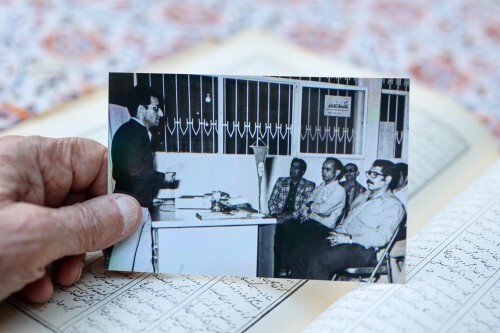
(17/54) “We still took long walks together. Mitra hated walking through deep forests, they were too dark. She’d imagine that predators were hiding behind every tree. By that time I’d begun to organize the workers at my factory. I’d hold weekly meetings and speak to them about their rights, but Mitra wanted me to stop. She thought it was too dangerous to speak out in a closed society. The Shah had brought many freedoms to Iran, but there’s one place he stopped short: political freedom. No dissent was allowed. No criticism appeared in the media. And his secret police SAVAK had a reputation for violence. Many of his political opponents shared brutal stories of their treatment in prison. After our Niroo meetings Parvaneh became extremely anti-Shah. She was the basketball player; the one with the strongest voice. She married a fellow activist named Dariush Forouhar, and she joined the party he had formed. They wanted nothing less than full political freedom. And both of them went to jail several times for their views. Dr. Ameli tried to work within the system. He’d become a member of parliament, but when he spoke out against the king the Pan-Iranist Party was banned. The king saw himself as a king of old. He wanted to rule Iran with a single voice. One year I decided to write about the history of our factory. I saw it as a great example of the Iranian people coming together for a common cause. Forty thousand people were involved: materials had been contributed from local mines, a dam was constructed, an entire city was built for the workers. It had truly been a national project. I spent an entire year on the book. But before it could be published, it had to be reviewed by the secret police. They told me it could not be published unless it was dedicated to the leadership of the Shah. It was abhorrent to me. The Shah played a role, but the factory had been built by the people. By giving all the credit to one man, it takes away their authorship. I told them: ‘Write whatever you want. But take my name off it.’”
پایان هفتهها به پیادهرویهای طولانی میرفتیم. تلاش میکردیم که فضاهای باز را انتخاب کنیم زیرا میترا از پیادهروی در میانهی جنگل بیزار بود. بیش از اندازه برای او تاریک مینمود. میپنداشت که مهاجمان در پس هر درختی به کمین نشستهاند. میترا همچنان تلاش میکرد که مرا از مبارزهی سیاسی باز دارد. او برآن بود که سخن گفتن در جامعهی بسته خطرناک است. برای رفاه کارگران با یاری چهار تن از همکاران برنامهریزیهایی کردیم. در کمیتهی عالی رفاه که پس از کار روزانه گرد میآمدیم، برای کارکنان ذوب آهن قانون استخدامی مدرنی که در مقایسه با قانونهای کشورهای اروپایی و ژاپن بهتر بود، نوشتیم. شاه آزادیهای زیادی را برای ایران به ارمغان آورده بود ولی در یک جا کوتاهی میکرد: آزادیهای سیاسی. صدای مخالفی را تحمل نمیکرد. هیچگونه انتقادی در رسانهها روا نبود. ساواک، در به کار بردن خشونت زبانزد بود. بسیاری از مخالفان سیاسی او داستانهای دلآزاری از چگونگی رفتار در زندان بازگو کردهاند. پس از گردهمآییهای نیرو، پروانه بسیار ضد شاه شد. او بازیکن بسکتبال بود؛ صدایی رسا داشت و هیچ چیز مگر آزادی کامل سیاسی را نمیپذیرفت. او با همسرش داریوش فروهر در حزب ملت ایران فعال بود. چندین بار به دلیل دیدگاههایش زندانی شده بود. دکتر عاملی تلاش کرده بود که در درون نظام به فعالیت بپردازد. نمایندهی مجلس شده بود، ولی هنگامی که علیه سیاستهای شاه سخن گفته شد از فعالیت حزب پانایرانیست جلوگیری کردند. شاه خود را از پادشاهان روزگار باستان میانگاشت. میخواست ایران را یکه و تنها رهبری کند. بر آن شدم که تاریخ کارخانه را بنویسم. آن را نمونهای برجسته از همکاری مردم ایران برای هدفی مشترک میدیدم. چهلهزار نفر در کار ساختنش دست داشتند: تأمین مواد اولیه، از معادن بومی آهن و زغال سنگ فراهم آمده بود، سدی بزرگ برای تأمین آب کارخانه و پیرامون آن و شهری کامل با مکانهای آموزشی، بهداشتی و رفاهی برای کارگران ساخته شده بود. به راستی که یک برنامهی ملی بود. ولی پیش از انتشار کتاب، بایستی در ساواک بررسی میشد. پاسخ آنها چنین بود که این کتاب منتشر نمیشود مگر آنکه از شاه ستایش و به او پیشکش شود. برای من بسیار ناخوشایند بود. با وجود اینکه شاه در آن کار بزرگ نقش داشت، ولی کارخانه به دست مردم ساخته شده بود. واگذاری همهی افتخارات به یک فرد - نقش مردم را بیاهمیت میکرد. یک سال تمام برای نوشتن آن کتاب کوشیده بودم. به آنها گفتم که میتوانند نوشتههایم را هر گونه که میخواهند چاپ کنند ولی نام مرا از روی آن بردارند
(16/54) “When the children were old enough I started reading...
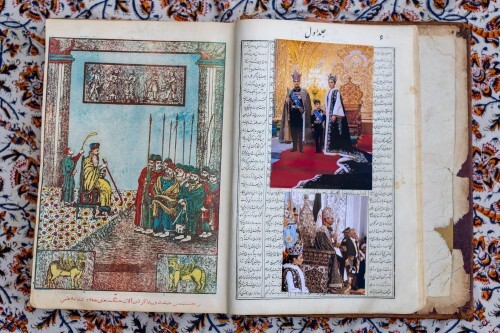
(16/54) “When the children were old enough I started reading them Shahnameh before they went to sleep. The stories of Rostam were too violent. They’d cry and cry. So I started with the stories of Iran’s mythic kings. These were the first kings of Iran. They discovered fire, language, and law. Some of them spoke to animals. Others lived for hundreds of years and sat on floating thrones made entirely of precious stones. It’s not known if Ferdowsi intended to name his book Shahnameh. The Book of Kings. But the title fits. For as long as there has been an Iran, there has been a king. In 1967 Mohammed Reza held a coronation ceremony. By that time he’d already been king for twenty years. But he’d wanted his coronation to wait, until Iran was prosperous. And now it was. The Shah had come a long way since that day I’d first seen him in the shrine. He’d tightened his grip on power, and his popularity was at an all-time high. The White Revolution had been a massive success. Iran was rapidly industrializing. Millions of Iranians were lifted out of poverty. Hundreds of new schools and universities were built. And it was a time of great freedom. Iranian women had more rights than anywhere else in the Muslim world. They could vote, obtain a divorce, own property, and run for office. In the words of Saadi: ‘The homeland is where no one disturbs the other.’ In Tehran you could see women in mini-skirts standing next to women who were fully-veiled. On the day of his coronation The Shah rode to the palace in a golden carriage pulled by eight Hungarian stallions. As he passed the streets were filled with shouts of ‘Long Live The King!’ Trumpets blared. Guns fired. The Air Force dropped 17,532 roses from the sky. One for every day of his life. At the coronation a crown of diamonds was placed upon his head, and he took his seat on the famous Naderi throne. It was decorated with carvings of lions and dragons. And it was covered with 25,000 precious stones.”
هنگامی که بچهها به سن دبستان رسیدند، شبها خواندن داستانهای شاهنامه را پیش از خوابشان آغاز کردم. بسیاری از داستانهای رستم پر از خون وخشونت بودند. آنها را به گریه می انداخت. بنابراین از داستانهای پادشاهان افسانهای ایران آغاز کردم. آنها نخستین پادشاهان ایران و جهان آشنای آن روزگار بودند. آفرینندهی آتش، زبان و قانون. برخی از آنان جانوران را رام و با آنان زندگی میکردند. برخی دیگر سدها سال زنده میماندند و بر تختهایی که از سنگهای گرانبها درست شده بودند، مینشستند. روشن نیست که آیا فردوسی میخواست نام کتابش شاهنامه باشد یا نه. ولی نامی زیبندهی کتاب است. از نامه ی شهریاران پیش سخن میگوید: من این نامهی شهریاران پیش / بگفتم بدین نغز گفتار خویش. پادشاهی از ایران برآمده است. در سال ۱۹۶۷ مراسم تاجگذاریاش برگزار شد. تا آن هنگام بیش از بیست سال از پادشاهیاش گذشته بود. ولی او تاجگذاریاش را تا رسیدن به پیشرفت ایران به عقب انداخته بود. و اکنون پیشرفتی به دست آمده بود. شاه از نخستین باری که او را در حرم دیده بودم راه بلندی را پیموده بود. او بر قدرت سیاسیاش افزوده و محبوبیتش به اوج رسیده بود. انقلاب سفیدش موفقیتآمیز بود. میلیونها ایرانی از فقر رهایی یافته بودند. سدها مدرسه و دانشگاه نوین ساخته شده بود. ایران به سرعت در حال صنعتی شدن بود. و دوران آزادیهای بزرگ فرا میرسید. زنان ایرانی نسبت به دیگر جاها در جهان اسلام از حقوق بیشتری برخوردار بودند. آنها میتوانستند رأی بدهند، درخواست طلاق کنند، صاحب دارایی شوند و نامزد انتخابات گردند. سعدی چنین گفته بود: وطن آنجاست کآزاری نباشد / کسی را با کسی کاری نباشد. در تهران، زنانی را میشد دید که با دامنهای کوتاه در کنار زنانی با چادر و حجاب کامل ایستادهاند. در روز تاجگذاری شاه سوار بر کالسکهی سلطنتی زرین که به وسیلهی هشت اسب مجاری کشیده میشد به کاخش رفت. در طول راه، خیابانها پر از مردمی بودند که فریاد «جاوید شاه!» سر میدادند. شیپورها نواخته شدند. تفنگها شلیک شدند. و نیروی هوایی ۱۷۵۳۲ عدد گل سرخ از آسمان رها کرد. یک گل برای هر روز زندگیاش. در آیین تاجگذاری، شاه تاجی با ۳۰۰۰ قطعه الماس بر سر نهاد و بر تخت نادری نشست. تختی آراسته به ۲۵۰۰۰ یاقوت کبود، زمرد و یاقوت سرخ
(15/54) “After my injury Mitra said it was finally time to be...
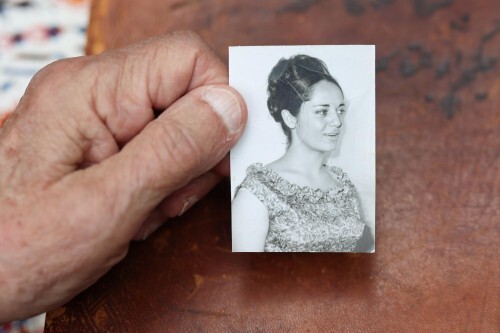
(15/54) “After my injury Mitra said it was finally time to be realistic. She began to use the words I would hear for the rest of my life: ‘You’ve already lost one eye for your ideals.’ I’d always respond the same way: “I’ve still got one eye left. And I’d like to see the world for as beautiful as it is.’ When we came home from Germany I promised that I’d never leave Iran again. Not even once. Not even on vacation. The only job I could find was at a steel factory. It wasn’t my ideal position. But wherever I am, I think of all of Iran. It was my hope that I could gain some experience and spearhead an industrial policy for the entire country. Inside the house Mitra was queen. She wanted everything in our house to be beautiful. She’d make entire booklets of beautiful things that she’d clipped from magazines: one for couches, one for lamps, one for tables. Mitra chose all of the children’s clothing. Sometimes they’d miss their bus because she was so particular. And whenever she decided, it was final. I tried to teach the children to use their voice. I’d tell them: ‘If you disagree with what I say, use your words.’ But Mitra was the opposite. She wanted her word to be the law, and that also applied to me. We once went to a famous carpet store in Tehran. Inside there were many beautiful trees. When Mitra asked the owner how he kept them so green, he said that every time he finishes a kettle of tea, he pours the remains on the roots of the trees. From that day on, Mitra made me pour the remains of our tea on the roots of our trees. She’d send me out in the middle of the night to do it. I tried to appeal to her reason. I told her that it made no sense. It was nonsensical. But inside our home her word was the law. Only once did I make a stand. When our youngest daughter was born, Mitra wanted to name her Kakoli, it’s a beautiful little bird with a plume on its head. But I had a different idea. We argued about it for weeks. And in the end we made a compromise. We agreed to call her Kakoli. But her name, would be Gordafarid.”
میترا امیدوار بود که پس از آسیب چشمم آرمانخواهیام را کنار بگذارم. او سخنانی میگفت که تا امروز هم میگوید: «زمان آن رسیده که با واقعیت روبرو شوی. تو یکی از چشمانت را در راه آرمانهایت از دست دادهای.» و من همواره اینگونه پاسخ دادهام: «هنوز یک چشم برایم مانده. و میخواهم جهان را با همهی زیباییهایش ببینم.» زمانی که از آلمان به ایران برگشتیم، با خودم پیمان بستم که دیگر هرگز ایران را ترک نکنم. حتا برای گردش. نخستین کاری که پیدا کردم در کارخانهی ذوبآهن بود. پیشهی آرمانیام نبود، ولی هر کجا که باشم همواره به ایران میاندیشم. امیدوار بودم تجربهای کسب کنم و سپس پیشگام برنامهای صنعتی برای همهی کشور شوم. در خانه میترا شهبانو بود. دوست داشت در خانهمان همه چیز زیبا باشد. او دفترچههای کاملی از بریدهی مجلهها درست میکرد: یکی برای اسباب و اثاث خانه، یکی برای چراغ، یکی برای میز و صندلی. همهی لباسهای بچهها را میترا انتخاب میکرد. آنها گاهی از اتوبوس جا میماندند چون او بسیار نکتهبین بود. و هرگاه تصمیمی میگرفت، نهایی بود. همیشه تلاش میکردم به بچهها بیاموزم که اندیشههای خودشان را بیان کنند. به آنها میگفتم: «اگر با آنچه که من میگویم همسو نیستید، نظر خودتان را بگویید.» ولی میترا آنگونه نبود. میخواست که گفتار او قانون باشد. و این امر شامل من نیز میشد. یکبار به فرشفروشی پرآوازهای در تهران رفتیم. درون فروشگاه درختچههای زیبای بسیاری دیده میشدند. میترا از صاحب فروشگاه پرسید چگونه آنها را سبز و خرم نگه میدارد. گفت هر بار که قوری چای تمام میشود، تفاله چای را به پای درختانش میریزد. از آن پس، میترا مرا وادار میکرد که مانده چایمان را پای درختان بریزم. نیمهشبها مرا وا میداشت که برای این کار به بیرون بروم. سعی کردم که بخردانه با او گفتوگو کنم. به او گفتم که این کار بیهوده است. خردمندانه نیست. ولی در خانه، سخن او قانون بود. تنها یک بار به ناسازگاری با او برخاستم. هنگامی که دومین دخترمان به دنیا آمد. میترا میخواست او را کاکُلی بنامد که نام پرندهی کوچک زیباییست با تاجی بر سر. ولی من خیال دیگری داشتم. هفتهها در اینباره گفتوگو کردیم. و در پایان با هم کنار آمدیم. به این توافق رسیدیم که او را کاکُلی بخوانیم ولی نامش گُردآفرید باشد
(14/54) “We began in darkness. Three hundred years after the...
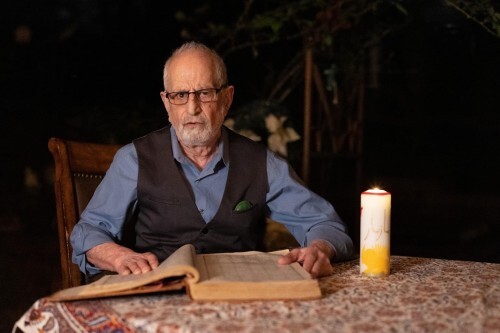
(14/54) “We began in darkness. Three hundred years after the Battle of Nahavand. The invaders had plundered the country. Caravans of riches were leaving day and night. There was a huge push to break our unity, to erase our identity, to make us forget ourselves. And whenever a conqueror tries to destroy a people, they begin with the language. Scholars were murdered. Books were burned. Entire libraries were razed to the ground. Whenever words were found, they were destroyed. A knight gathered all the texts that remained. And Ferdowsi stepped forward to weave them into a poem. In the prologue of Shahnameh he writes: ‘I am building a castle of words. That no wind or rain will destroy!’ Ferdowsi attempted to use only the purest form of Persian. He wanted to preserve the entirety of our language. All of our words. But it wasn’t just our language that he was trying to save, it was our story. Our wisdom. Our soul. Who we were. Ferdowsi drew from many different sources when writing Shahnameh. But one of the most important was The Avesta. The holiest book in ancient Iran. It included many of our oldest stories, from before the written word. In the heart of the book, away from the edges, safe from the sands of time, were the oldest words of Iran: the seventeen hymns of Zoroaster. They were three thousand years old. And they’re in the form of a poem. They tell the story of a battle between two great spirits: Ahura Mazda and Ahriman. Good and Evil. Light and Dark. Since the beginning of time these two spirits have been locked in a battle for the soul of the world. And every person must participate. There can be no spectators. There is always a choice to be made. Light or Dark. Good or Evil. 𝘕𝘦𝘦𝘬𝘪 or 𝘉𝘢𝘥𝘪. It’s a simple choice. But in that choice is an escape from destiny. A promise that the book is not yet written. There is still a role for us to play.”
در تاریکی آغاز شد. سیسد سال پس از جنگ نهاوند غارتگران داراییهای سرزمین ما را به تاراج برده بودند. کاروانهای انباشته از زر و گوهر روز و شب خارج میشدند. کارزار فراگیری برای از میان بردن هویت ایرانی به راه انداخته بودند. از زبانمان آغاز کردند. هر گاه فاتحی کمر به نابودی ملتی ببندد، بخواهد هویت آنها را از بین ببرد، بخواهد اتحاد آنها را بشکند، بخواهد آنها را از خود بیگانه کند، از زبان میآغازد. زبان آوند فرهنگمان است. نگهدارندهی تمامی گذشتهمان است. چسبیست که ما را در کنار هم نگه میدارد. دانشمندان کشته شدند. کتابها سوزانده شدند. تمامی کتابخانهها با خاک یکسان شدند. هر گاه نوشتههایی یافت میشد، نابود میکردند. فردوسی مینویسد که پهلوانی همهی نوشتههای بازمانده را گرد آورد. سپس فردوسی پذیرفت تا همه را به شعر برگرداند. او چنین سرود: پی افکندم از نظم کاخی بلند / که از باد و باران نیابد گزند! فردوسی کوشید که از نابترین واژگان فارسی استفاده کند. میخواست یکپارچگی زبانمان را پاس دارد. ولی این تنها واژگانمان نبودند که در تلاش پاسداری از آن بود، بلکه داستانهایمان نیز بود. جان و روان و شناسهی ما. آنچه که بودیم. در نوشتن شاهنامه، فردوسی از منابع گوناگون بسیاری بهره برد. برجستهترین آنها اوستا بود. کتاب سپنتای ایران. دربرگیرندهی کهنترین داستانهایمان از دوردست روزگار. در دل کتاب، دور از متنهای حاشیهای، در امان از گردباد زمانه، کهنترین واژگان و سخنان و نوشتههای ایران گنجانده شده بود: هفده گاتای زرتشت. با قدمتی سههزارساله که به شعر نوشته شدهاند. داستان نبرد میان دو نیروی بزرگ را روایت میکند: اهورا مزدا و اهریمن. نیکی و بدی. روشنایی و تاریکی. از ازل، این دو نیرو در نبردی همیشگی برای جان جهان بودهاند. همه میبایست در آن نبرد شرکت کنند. هیچ تماشاگری وجود ندارد. چرا که هر انسانی باید انتخاب کند. همیشه گزینهای وجود دارد. گزینهی سادهایست: روشنایی یا تاریکی. نیکی یا بدی. ولی در آن گزینش، گریزی از سرنوشت وجود دارد. نویدیست نانوشته. که در آن کارسازیم
(13/54) “In Germany we started a family. When our first daughter...
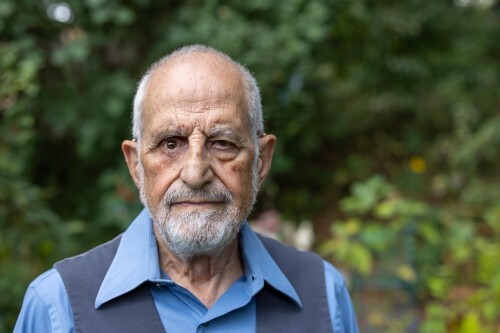
(13/54) “In Germany we started a family. When our first daughter was born we named her Ahang. Ferdowsi uses the word a lot in Shahnameh. It means melody, but it also means willpower. Eighteen months later our son Maziar arrived. After the children were born Mitra said it was time to choose a normal profession, and secure the life that we had. At university I studied mechanical engineering. But wherever I am, I think of all of Iran. There were many Iranian students living in Germany, so I started my own version of Niroo called the Assembly of Kaveh, after one of Shahnameh’s greatest champions. Kaveh is a special champion. He was a normal man. An ordinary blacksmith. But he rallies the people to defeat Zahak—the most evil king in all of Shahnameh. Our meetings were held in the back room of a local tavern. The meetings were more cultural than political, each week we’d lecture on a different topic. But I was outspoken about my support for the White Revolution. We’d lost half our family’s land as part of the land reform, but still: I supported it. I wrote my father a letter. I said: ‘Today we can hold our heads higher, because there is more freedom in Iran.’ One day we were in the middle of a meeting when the door was kicked in. Two hundred angry men rushed into the room. They were mainly members of a leftist group, but they’d also been infiltrated by The Shah’s secret police, SAVAK. Their agents had been tasked with creating conflict between student groups. The men went around the room, knocking over furniture. One of them broke a coke bottle against the table, and wielded it as a weapon. I stood up from my chair and rolled my papers in my hand. I said: ‘Please, sit down. Let us discuss. Let us use our words.’ One of them was dressed exactly like Fidel Castro. He picked up a chair and jabbed its leg directly into my eye. Blood started streaming from my face. My friends picked me off the floor and helped me to the basement of the tavern. After a few minutes a police car arrived to take me to the hospital, and I was loaded in the back. I began to lose consciousnesses. The last thing I remember was a horrible, sharp pain in my eye. Then everything turned to black.”
میترا و من در آلمان صاحب دختری شدیم. نامش را آهنگ نهادیم. این واژهایست که فردوسی در شاهنامه بارها به کار برده است. به معنای نغمه و آواز، به معنای ارادهی راسخ نیز هست. هجده ماه پس از او پسرمان مازیار پا به دنیا نهاد. پس از به دنیا آمدن فرزندانمان، میترا از من خواست که پیشهای معمولی برگزینم. آسایش و آرامشی داشته باشیم. در دانشگاه، مهندسی مکانیک میخواندم. ولی هر جا باشم، ایران با من است. از آنجا که در آلمان دانشجویان ایرانی بسیار بودند، پس از رایزنی با دوستان بر آن شدیم که سازمانی فرهنگی-سیاسی برپا کنیم. نامش را «انجمن ملی کاوه» نهادیم، به افتخار یکی از نامدارترین پهلوانان شاهنامه. کاوه پهلوانیست ویژه. او از تبار آزاده مردمان بود. آهنگری ساده. ولی بر ضحاک، پلیدترین شاه شاهنامه شورید. دیدار هفتگیمان را در اتاقی ویژهی نشستها و گردهمآییها در میخانهای محلی برگزار میکردیم. هر هفته به جُستار متفاوتی میپرداختیم: تاریخ، شعر، ادبیات، معماری و جز آن. گردهمآییهایمان بیشتر فرهنگی بود تا سیاسی. ولی من انقلاب سفید را نیز پشتیبان بودم. با اصلاحات ارضی نیمی از زمینهای خانوادگیمان از دست رفته بود ولی من با خرسندی به پدرم نوشتم که: «امروز میتوانیم سرمان را بالاتر بگیریم زیرا عدالت، آزادی و آسایش بیشتری در ایران پدید میآید.» شبی در میانهی گردهمآییمان ناگهان در اتاق باز شد. چند سد تن از مردان خشمگین به اتاق ما یورش آوردند. ما بیستوچند تن بودیم. آنان اعضا و هواداران کنفدراسیون دانشجویان ایرانی بودند. کنگرهی سالانهشان را در شهر ما برپا کرده بودند. ساواک درگیری میان دانشجویان ایرانی را به سود خود میدانست. بیشتر آنان طرفداران چپ وابسته به سیاستهای شوروی و دیگر کشورهای کمونیستی بودند و با ناسیونالیسم و انقلاب سفید مخالفت داشتند. یکی از آنها بطری نوشابهای را شکست و به هوا برد. یکی که مانند فیدل کاسترو لباس پوشیده بود دور اتاق چرخید و پس از پرسیدن نام من روی میز جلوی من نشست. کاغذهایم را لوله کردم و از جا برخاستم. گفتم: «خواهش میکنم بنشینید تا با هم گفتوگو کنیم.» او صندلی را برداشت و پایهی آن را یکراست به چشم راست من کوبید. دوستان، مرا به زیرزمین میخانه رساندند که ایمنتر بود. مهاجمان آمبولانسی را که برای بردن من رسیده بود، واژگون کردند. ناگزیر مرا در ماشین پلیس به بیمارستان رساندند. آرام آرام هوشیاریام از دست میرفت. آخرین چیزی که به یاد دارم، احساس دردی شدید در چشمم بود. دیگر چیزی به یاد ندارم
Brandon Stanton's Blog
- Brandon Stanton's profile
- 768 followers



